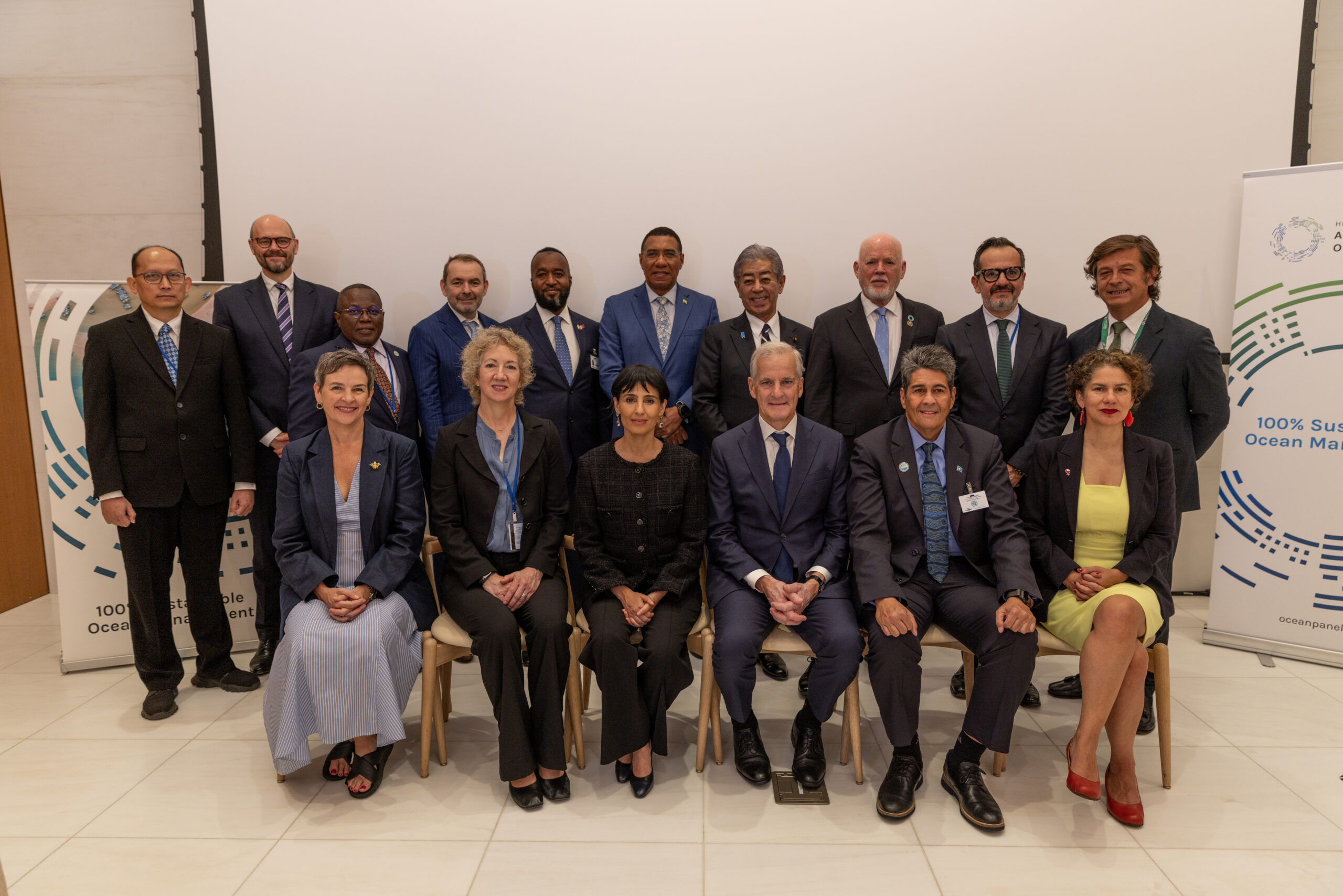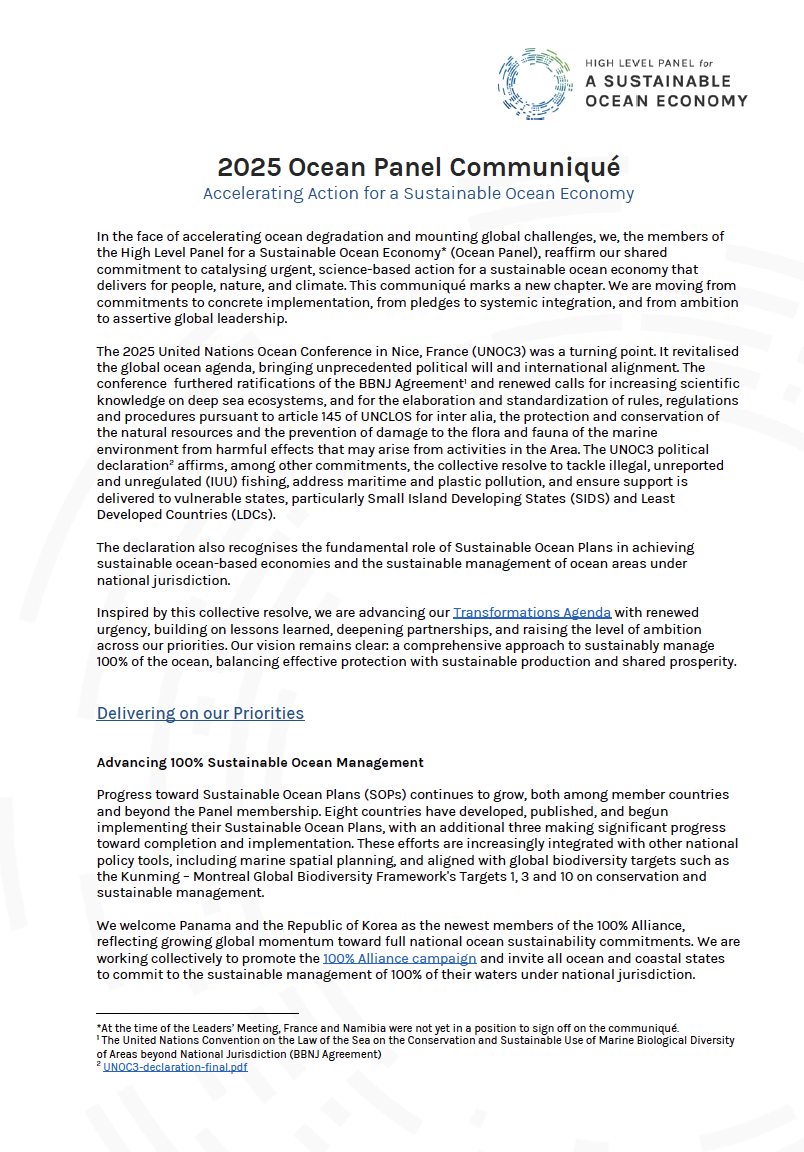Accelerating Action for a Sustainable Ocean Economy
In the face of accelerating ocean degradation and mounting global challenges, we, the members of the High Level Panel for a Sustainable Ocean Economy* (Ocean Panel), reaffirm our shared commitment to catalysing urgent, science-based action for a sustainable ocean economy that delivers for people, nature, and climate. This communiqué marks a new chapter. We are moving from commitments to concrete implementation, from pledges to systemic integration, and from ambition to assertive global leadership.
The 2025 United Nations Ocean Conference in Nice, France (UNOC3) was a turning point. It revitalised the global ocean agenda, bringing unprecedented political will and international alignment. The conference furthered ratifications of the BBNJ1 Agreement1 and renewed calls for increasing scientific knowledge on deep sea ecosystems, and for the elaboration and standardization of rules, regulations and procedures pursuant to article 145 of UNCLOS for inter alia, the protection and conservation of the natural resources and the prevention of damage to the flora and fauna of the marine environment from harmful effects that may arise from activities in the Area. The UNOC3 political declaration2 affirms, among other commitments, the collective resolve to tackle illegal, unreported and unregulated (IUU) fishing, address maritime and plastic pollution, and ensure support is delivered to vulnerable states, particularly Small Island Developing States (SIDS) and Least Developed Countries (LDCs).
The declaration also recognises the fundamental role of Sustainable Ocean Plans in achieving sustainable ocean-based economies and the sustainable management of ocean areas under national jurisdiction.
Inspired by this collective resolve, we are advancing our Transformations Agenda with renewed urgency, building on lessons learned, deepening partnerships, and raising the level of ambition across our priorities. Our vision remains clear: a comprehensive approach to sustainably manage 100% of the ocean, balancing effective protection with sustainable production and shared prosperity.
Delivering on our Priorities
Advancing 100% Sustainable Ocean Management
Progress toward Sustainable Ocean Plans (SOPs) continues to grow, both among member countries and beyond the Panel membership. Eight countries have developed, published, and begun implementing their Sustainable Ocean Plans, with an additional three making significant progress toward completion and implementation. These efforts are increasingly integrated with other national policy tools, including marine spatial planning, and aligned with global biodiversity targets such as the Kunming – Montreal Global Biodiversity Framework’s Targets 1, 3 and 10 on conservation and sustainable management.
We welcome Panama and the Republic of Korea as the newest members of the 100% Alliance, reflecting growing global momentum toward full national ocean sustainability commitments. We are working collectively to promote the 100% Alliance campaign and invite all ocean and coastal states to commit to the sustainable management of 100% of their waters under national jurisdiction.
Global Ocean Observations
The foundation of sustainable ocean planning is robust, accessible, and well-distributed ocean data. Yet, the global ocean observing system is under threat. With traditional funding sources reducing support, the continuity of critical ocean observations is at risk. We reaffirm our commitment to scaling up integrated local-to-global observation systems and call for collective investment to safeguard this global public good. Strengthening ocean observation is essential to inform Sustainable Ocean Plans, support climate resilience, and ensure equitable access to ocean knowledge for all.
The ocean is a vital ally in the fight against climate change. We are enhancing resilience through nature-based solutions, including the conservation and restoration of blue carbon ecosystems such as mangroves, seagrass meadows, kelp forests and salt marshes. The Blue NDC Challenge, launched at UNOC3, calls on coastal nations to integrate ocean-based solutions into their Nationally Determined Contributions (NDCs), reinforcing the ocean’s central role in climate resilience. Eight countries have already joined the Challenge, sending a clear signal that the ocean–climate nexus is increasingly recognised as a priority.
Building on this momentum, we recognise the importance of integrating ocean-based clean energy solutions, such as offshore wind and/or wave energy, as part of the decarbonisation pathway. This potential of the ocean not only reduces reliance on fossil fuels but also provides opportunities for innovation and energy security, particularly for vulnerable dependent coastal and island states. By scaling up investments in ocean-based clean energy solutions, it reinforces the ocean’s role as both a buffer against climate impacts and a driver of sustainable economic development.
There are significant linkages between our work to protect biodiversity and combat climate change. For example, sustainable fisheries management leads to healthy fish stocks which could require less fuel-intensive fishing effort, thereby reducing emissions. This reduces the risk of overfishing, supporting ecosystem balance, and protecting marine food webs. It also promotes productivity, a major catalyst for the attainment of the Sustainable Development Goals, particularly Goal 2 (food security and ending hunger) and Goal 8 (economic growth and decent work).
We commit to further championing the integration of ocean action into climate efforts to meet the long-term objectives of the Paris Agreement, and to highlight the crucial importance of the ocean-climate nexus at the 30日 Conference of the Parties (COP 30) in November 2025.
Securing Food and Livelihoods Through Sustainable Fisheries and Aquatic Foods
We reaffirm the vital role of a sustainable seafood sector – including both wild-capture fisheries and aquaculture in ensuring food security and nutrition. We are exploring actions to support a climate resilient seafood sector, and by extension safeguard the livelihoods of those who depend on it and the continued viability of the coastal communities they sustain. We commit to the promotion and consumption of sustainable aquatic foods as part of resilient food systems, and remain committed to inclusive and just transitions in ocean food production.
Mobilising Ocean Finance at Scale
Despite growing attention, the ocean finance gap remains stark – estimated at 550 billion (USD) annually. We echo the call from UNOC3 for urgent, scaled investment to prevent biodiversity collapse, secure food systems, and strengthen climate resilience. We have taken concrete steps to unlock and align finance with ocean sustainability goals. We will continue to work with partners to improve inclusive access to finance, improve countries’ readiness for the effects of climate change, de-risk investments, and support solutions that are ecologically sustainable and socially inclusive. We will continue to share experiences and lessons learned, and to showcase sustainable and affordable finance models that can be scaled and replicated.
We commit to forming a dedicated working group to integrate 海洋金融 actions into the broader ocean narrative.
Embedding Ocean Equity and Inclusion
We are committed to integrating equity into all aspects of ocean governance. This includes supporting women and youth, promoting ocean literacy, and ensuring Indigenous Peoples and local communities play a central role in the conservation and sustainable use of the ocean and its resources. After all, no ocean management strategy can succeed without the genuine integration of communities, as active partners in decision-making and implementation.
We commit to publishing a standardised framework for ethically and equitably considering Indigenous, traditional and local knowledge alongside key governance mechanisms. This recognises that Indigenous Peoples and local communities are the holders of their respective knowledge, innovations and practices, and therefore access should be subject to their free, prior, and informed consent (FPIC) or approval and involvement.
Driving Global Progress
We recognise the importance of international frameworks and international agreements in realising our vision. We will actively support the implementation of key frameworks and agreements including:
- The BBNJ Agreement entering into force, is within reach. We urge the remaining governments to act swiftly to reach the 60-country threshold needed for the Agreement to enter into force.
- The Port State Measures Agreement (PSMA)
- The World Trade Organisation Agreement on Fisheries Subsidies
- Ensuring sustainable management and international trade of marine animals and plants through the Convention on International Trade in Endangered Species of Wild Fauna and Flora (CITES)
- The ongoing multilateral processes aimed at achieving an International legally binding instrument on plastic pollution, including in the marine environment.
- The United Nations Fish Stock Agreement (UNFSA). We encourage all countries to ratify the Agreement and fully implement its provisions such as applying the precautionary and ecosystem-based approaches and actively participate in RFMOs to ensure sustainable management of shared and migratory stocks.
- New and amended instruments and measures of the International Maritime Organization that support coordinated action on biodiversity and pollution at the ocean-climate nexus, including in the implementation of the Organization’s GHG emissions reduction strategy, that also encompasses work towards cleaner and more fuel-efficient ships and reduces the risk of invasive species from biofouling and reduce underwater noise.
- The United Nations Decade of Ocean Science for Sustainable Development (2021-2030). We invite countries to continue to advance the development of science and knowledge to inform policy and decision-making, including through the Ocean Decade.
结论
In this decisive moment for our ocean, the Ocean Panel remains committed to setting the pace and direction of global ocean governance through science-based action, partnership, and the open sharing of knowledge, tools, and experience
The momentum generated at the 2025 UN Ocean Conference has made one thing clear: it is time to move from fragmented efforts to systemic transformation. From promises to delivery.
The ocean is central to our collective future. We call on the global community to join us in turning the tide – for the ocean, and for generations to come.
*At the time of the Leaders’ Meeting, France and Namibia were not yet in a position to sign off on the communiqué.
1 The United Nations Convention on the Law of the Sea on the Conservation and Sustainable Use of Marine Biological Diversity of Areas beyond National Jurisdiction (BBNJ Agreement)


 以前的
以前的



